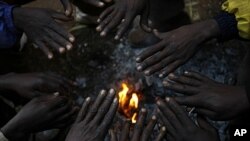The International Federation of the Red Cross Red Crescent Societies, or IFRC, has launched a five-year initiative in southern Africa to address humanitarian issues arising from mass migration. The Societies plan to use their community-based volunteers to facilitate social inclusion in communities that are sending or receiving migrants.
In May 2008, an outbreak of mostly anti-migrant violence, centered around Johannesburg, killed 62 people, injured hundreds more and displaced about 16,000. Even though one-third of those killed were South African, the events of that month highlighted the ongoing problem of xenophobia in the country.
Following the end of apartheid, African migrants streamed into the country, with relatively few seeking to normalize their status by applying for asylum or other legal residence documents. Many of these individuals moved into traditionally poor black communities, where there were already shortages of housing, clinics, schools, and municipal services and where millions live on the fringes in informal settlements.
There was a perception among people in these deprived communities, sometimes based on fact and sometimes not, that they now had to compete for scarce resources with the growing number of foreign nationals. That tension, coupled with high levels of crime, helped spark the May 2008 violence.
In late 2009 the South African Red Cross launched a study in communities affected by the 2008 violence to further understanding of what had happened.
Winnie Ndebele, the group's acting secretary-general, says the study revealed that South Africans were feeling increasingly uncertain and threatened themselves.
“I am just saying from the study we were surprised to get what people were telling us, how much they were threatened themselves," she says. "And then we could see that actually some of them were victimized or they were victims - they were either victimized by foreign nationals or they were victims of the whole circumstances, as it was happening at that time.”
Now the Red Cross and Red Crescent societies want to work with communities in South Africa, Lesotho, Mozambique, Swaziland and Zimbabwe to emphasize the positive aspects of migration while also seeking to counteract its negative effects.
The five year program will be known as Ubuntu, a South African humanist philosophy described by Nobel Peace laureate Desmond Tutu as the essence of being human. The philosophy emphasizes that people are interconnected and cannot exist in in isolation.
Ken Odur, IFRC Regional Representative, says "ubuntu" describes what the societies hope to achieve in communities either receiving or sending migrants, that being socially inclusive can bring benefits.
“Some of big economies in the world today were actually built by the expertise and the capital of migrants," he said. "So there could be a mutually reinforcing argument here to say look, if migration is well managed, it can be beneficial.”
Odur says that because the Red Cross and Red Crescent Societies in the five countries were established through acts of parliament, they have unique relationships with their governments which they will use to benefit the Ubuntu initiative.
“So we will do mobilization and social mobilization at various levels, at the community level, and also at the highest levels of government. I think our best advocate is our work," Odur added. "When disaster strikes, governments realize that they have a key partner in the Red Cross and through that it opens doors for more dialogue. So yes indeed, governments realize that we have a role to play and they have been engaging with us on a number of occasions.”
Ndebele says the South African society has already started training its volunteers, and started programs in local communities and hopes to help the other countries do the same.
“This is exactly what we want to do in Ubuntu; we don’t want to work in [information] silos because as I [told] you we have started in South Africa through our volunteers, but we want to do it in collaboration with other countries, so that we have one message that is very effective to our people who are victimized through displacement,” she said.
Regional representative Odur says Ubuntu should begin yielding positive results within a year, but that benefits will accumulate over time.




